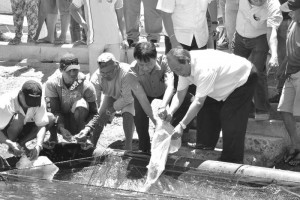
In the coming months, consumers can expect prices of fish going down following the integrated intervention undertaken by the multi-sectoral group working with the provincial government’s technical working group (TWG) in addressing the concern on high prices of fish in Bohol compared to other areas of the country.
The Provincial Agriculturist’s Office finally received the freezer van from the Bureau of Fisheries and Aquatic Resources (BFAR) on February 21 that could be utilized in bringing fish from the landing ports to the fish terminals and bagsakan centers in Tagbilaran and Panglao.
Larry Pamugas, in-charge of the Provincial Agriculturist’s Office, explained though that the TWG can only settle up to the fair price level as win-win solution so that fish traders can also sustain the industry through reasonable return of investment, considering that they also invested on operational costs.
Gov. Edgar Chatto formally received the freezer van from Leo Bongalos of BFAR during a simple ceremony on Tuesday last week.
Bongalos said BFAR personnel and a team from the Provincial Agriculturist’s Office had been trained on how to efficiently utilize the freezer van in preparation for the start of operation this week.
Department of Trade and Industry (DTI), Consumer Watch Bohol Inc., and the vendors’ association also get involved in this operation.
This is in response to Chatto’s request for a freezer van in Bohol, to cut the layers of middlemen during the process of bringing the fish from the landing ports to the market.
The TWG also plan to equip fish terminals and bagsakan centers with cooling machines
On the other hand, Chatto led the turn-over and ceremonial stocking of Bangus fingerlings in fish cage in Talibon gym wherein he also handed the certificates of award to beneficiaries on Friday.
The governor had already turned over fish cages to qualified beneficiaries in Candijay on April 16, then to beneficiaries in barangay Manga in Tagbilaran City the following day. Fisherfolk in Tubigon received their fish cages early last week.
The provincial government also turned over 16-horsepower engines from BFAR to coastal municipalities, in support to the programs of the Coastal Law Enforcement Council (CLEC).
Pamugas explained that the fishery sector should find alternatives, instead of relying solely on open-sea fishing.
The provincial government and BFAR help residents of coastal areas establish fish cages, especially those affected by the typhoons that hit the province in December last year, as one of the alternatives.
Open-sea fishing has been affected by the full moon and cold weather, making the catch unpredictable and seasonal.
This has been identified as on factor of unstable supply of fish in the market and one of the reasons for the prices to increase at times.
In fish cages, the fishermen can control the harvest and supply in the market is assured, according to Pamugas.
Ensuring enough supply of fish in the market to meet the rising demand helps stabilize the prices, Pamugas added.

hinaut unta!
may-unta kada municipal adunay monitoring team sa prices sa isda ug sa ila timbangan kon sakto ba, mahal pa dili sakto ila kilohan